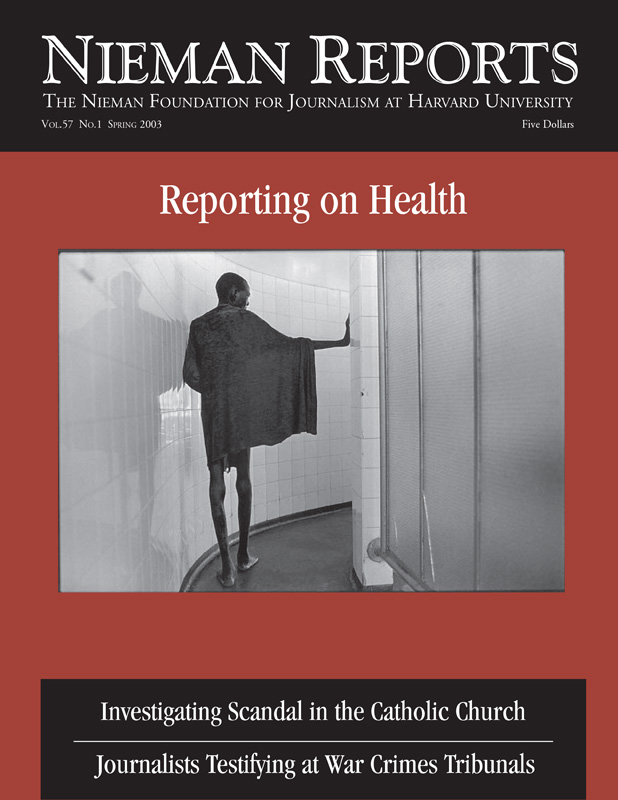What follows are excerpts from a witness statement that Roy Gutman, diplomatic correspondent for Newsweek, filed in the motion on behalf of Jonathan Randal to set aside his confidential subpoena to give evidence.
RELATED ARTICLE
"Consequences Occur When Reporters Testify"
- Roy GutmanThe role reporters played in bringing the crimes to light puts the journalistic profession in a difficult position when the tribunal follows up on news media leads. The objective of our profession is to make public the best material we have and to do it quickly, accurately, and in a way that compels credibility. Professionalism obliges us to protect our sources, to be responsible for our judgment, to correct our errors, and in general to operate in a manner that permits us to return to the scene and carry on with reporting. A journalist must be able to claim he or she has not taken sides or become partisan, but has simply reported the facts. Returning to the scene and reporting further is an assertion of that claim.
Anyone who believes justice must be done will want to cooperate at least informally with investigators, and that is the practice of journalists the world over. But there is serious debate within the profession when it comes to testifying before the U.N. International Criminal Tribunal for the Former Yugoslavia (ICTY) or International Criminal Tribunal for Rwanda (ICTR). Based on my own experience and that of my colleagues, and after thinking about this issue long and hard, I believe testifying puts the above stated professional obligations in jeopardy.
In a recent book on humanitarian law entitled “Crimes of War” that I coedited, Richard Goldstone, former chief prosecutor at ICTY, recommended that reporters be given protection similar to that afforded aid workers. “Like aid workers and Red Cross or Red Crescent delegates, if reporters become identified as would-be witnesses, their safety and future ability to be present at a field of battle will be compromised,” Justice Goldstone wrote. “I would therefore support a rule of law to protect journalists from becoming unwilling witnesses in situations that would place them or their colleagues in future jeopardy …. They should not be compelled to testify lest they give up their ability to work in the field, but they may of course testify voluntarily.” I wholly endorse Justice Goldstone’s comments.
RELATED ARTICLE
"Consequences Occur When Reporters Testify"
- Roy GutmanThe role reporters played in bringing the crimes to light puts the journalistic profession in a difficult position when the tribunal follows up on news media leads. The objective of our profession is to make public the best material we have and to do it quickly, accurately, and in a way that compels credibility. Professionalism obliges us to protect our sources, to be responsible for our judgment, to correct our errors, and in general to operate in a manner that permits us to return to the scene and carry on with reporting. A journalist must be able to claim he or she has not taken sides or become partisan, but has simply reported the facts. Returning to the scene and reporting further is an assertion of that claim.
Anyone who believes justice must be done will want to cooperate at least informally with investigators, and that is the practice of journalists the world over. But there is serious debate within the profession when it comes to testifying before the U.N. International Criminal Tribunal for the Former Yugoslavia (ICTY) or International Criminal Tribunal for Rwanda (ICTR). Based on my own experience and that of my colleagues, and after thinking about this issue long and hard, I believe testifying puts the above stated professional obligations in jeopardy.
In a recent book on humanitarian law entitled “Crimes of War” that I coedited, Richard Goldstone, former chief prosecutor at ICTY, recommended that reporters be given protection similar to that afforded aid workers. “Like aid workers and Red Cross or Red Crescent delegates, if reporters become identified as would-be witnesses, their safety and future ability to be present at a field of battle will be compromised,” Justice Goldstone wrote. “I would therefore support a rule of law to protect journalists from becoming unwilling witnesses in situations that would place them or their colleagues in future jeopardy …. They should not be compelled to testify lest they give up their ability to work in the field, but they may of course testify voluntarily.” I wholly endorse Justice Goldstone’s comments.



